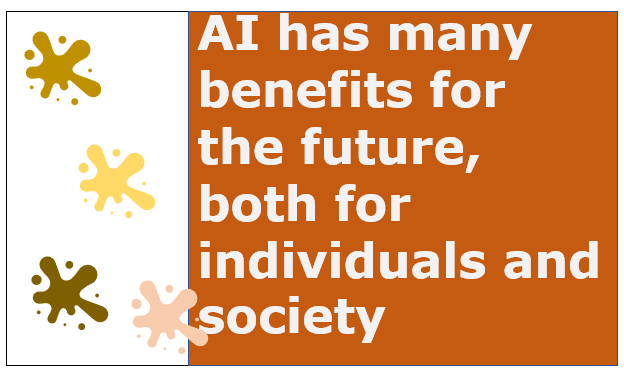Pros and Cons AI for the future, both for individuals and society
AI has many pros or benefits for the future, both for individuals and society. Here are some of them:
AI can help eliminate the necessity for humans to perform tedious tasks1, such as data entry, accounting, or customer service. This can free up time and energy for more creative and meaningful work.
AI can help make some workers more productive than ever, such as doctors, lawyers, and computer programmers. AI can assist them with diagnosis, research, analysis, and optimization of their tasks.
AI can help provide quality education to everyone, regardless of their location, background, or resources. AI can tailor the learning experience to each student’s individual needs, preferences, and goals. AI can also help teachers with grading, feedback, and curriculum design.
AI can help improve the quality of life and well-being of people, such as by enhancing health care, entertainment, communication, and personalization. AI can help detect and treat diseases, recommend movies and music, connect people with similar interests, and customize products and services.
AI can help solve some of the biggest challenges facing humanity, such as climate change, poverty, hunger, and inequality. AI can help analyze data, model scenarios, optimize solutions, and coordinate actions for these complex and global problems.
AI has a lot of potential to make the world a better place. However, it also comes with some risks and challenges that need to be addressed carefully. For example:
AI can pose ethical and moral dilemmas6, such as who is responsible for the actions and outcomes of AI systems, how to ensure fairness and transparency in AI decisions, and how to respect human dignity and autonomy in AI interactions.
AI can create social and economic disruptions, such as displacing workers from their jobs, increasing inequality and polarization, and undermining trust and security. These impacts may affect different groups of people differently depending on their skills, education, income, and location.
AI can raise technical and practical difficulties, such as how to ensure the reliability and safety of AI systems, how to prevent malicious use or abuse of AI by hackers or adversaries, and how to cope with the uncertainty and complexity of AI behavior.
AI is a powerful technology that can have both positive and negative effects on the future. It is important to be aware of both the benefits and the challenges of AI, and to engage in informed and responsible dialogue about how to use it for good.
AI also has some cons for the future, both for individuals and society. Here are some of them:
AI can be costly to implement and maintain1, as it requires high-end hardware, software, data, and human expertise. AI systems may also need constant updates and upgrades to keep up with the changing needs and expectations of users and customers.AI can lack emotion and creativity1, as it is based on logic and data.
AI may not be able to understand or empathize with human feelings, values, and preferences. AI may also not be able to generate novel or original ideas or solutions that go beyond existing patterns and rules.AI can degrade human skills and intelligence1, as people may become over-reliant on AI systems and lose their ability or motivation to think critically, learn new things, or solve problems on their own. AI may also create a digital divide between those who have access to AI and those who do not.AI can reduce jobs for humans12, as it may replace or displace workers from their tasks, especially those that are repetitive, formulaic, or generic. This may create unemployment, underemployment, or income inequality for some groups of people, especially those with low skills, education, or income.AI can pose ethical and moral dilemmas13, such as who is responsible for the actions and outcomes of AI systems, how to ensure fairness and transparency in AI decisions, and how to respect human dignity and autonomy in AI interactions.
AI may also raise questions about the rights and obligations of AI agents, such as robots or chatbots.AI can create social and economic disruptions24, such as displacing workers from their jobs, increasing inequality and polarization, and undermining trust and security. These impacts may affect different groups of people differently depending on their skills, education, income, and location.AI can raise technical and practical difficulties2 , such as how to ensure the reliability and safety of AI systems, how to prevent malicious use or abuse of AI by hackers or adversaries, and how to cope with the uncertainty and complexity of AI behavior.
.png)
